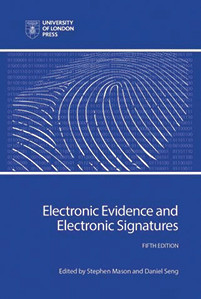‘This is a valuable addition to the bookshelf; not just for practitioners, but for those interested in —or simply curious about—the topics covered’

Editors: Stephen Mason and Daniel Seng
Publisher: University of London Press
ISBN: 978-1-911507-26-0 (Hardback), 978-1-911507-22-2 (Paperback)
RRP: Hardback £75/ Paperback £55
Readers—‘Give it welcome!’ There are more things in Electronic Evidence and Electronic Signatures, edited by Stephen Mason and Daniel Seng, than I had ever dreamt of, philosophically or otherwise.
The book describes itself as a ‘well-established practitioner text’. It is certainly well-established (though previously as two separate books, now amalgamated in the current edition). To describe it as a practitioner text is too modest. Certainly, it answers many practical questions but it goes beyond being a mere handbook in its depth and range.
Range & scope
Reading that the text is based ‘on the law of England and Wales, with appropriate citations of relevant case law and legislation from other jurisdictions’ gives little inkling of its depth. The









